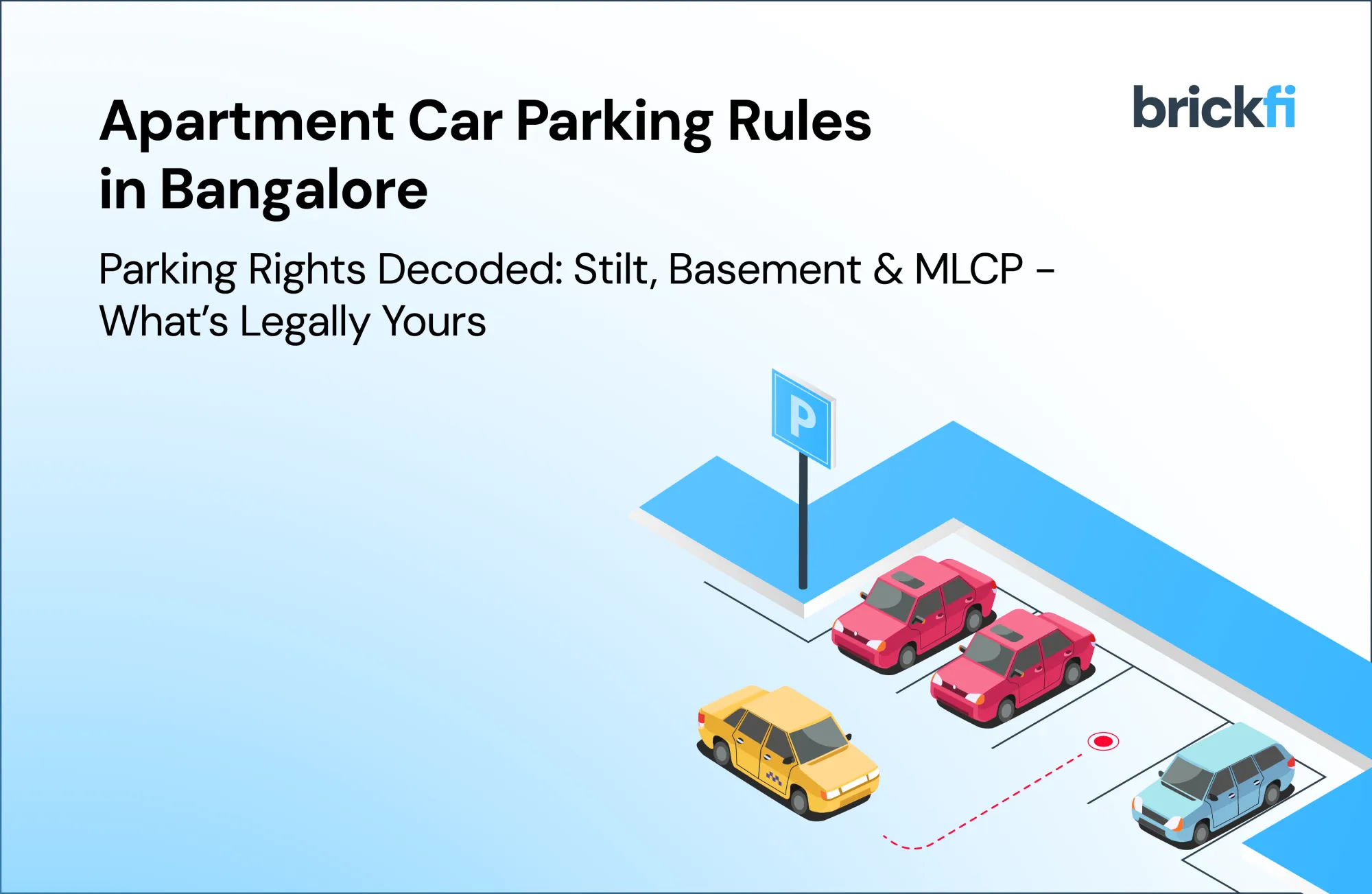Parking Rights Decoded: Stilt, Basement & MLCP What’s Legally Yours
Confused about apartment car parking rules in Bangalore? Learn the legality of stilt parking, basement allotment, and MLCP slots under RERA and Karnataka laws.

Key Takeaways
- Apartment car parking rules in Bangalore are governed by RERA, Karnataka Apartment Ownership Act, and local municipal norms, not just what the builders say and promise.
- Stilt floor parking and basement parking are common areas, not for individual sale. Builders cannot sell them separately.
- Apartment parking allotment rules allow parking to be assigned (not sold) by builder/society through transparent methods like lottery or rotation.
- Stilt parking rules were clarified by the Supreme Court; they count as “common areas” and must remain under collective ownership.
- MLCP (Multi-Level Car Parking) slots can be allotted as per sanctioned plans, but pricing/allotment must follow regulations.
- Homebuyers should always verify approved building plan + RERA disclosures to confirm parking legality before purchase.
Why Parking Rights Matter in Apartment Living
In Bangalore’s high-density apartment projects, parking disputes are as common as maintenance fee fights. From residents discovering fewer slots than promised, to builders selling basement spots illegally, confusion around apartment car parking rules leads to endless conflict.
For a homebuyer spending crores on an apartment, clarity on what parking you’re entitled to, who owns it, and how allotment works is as critical as knowing your carpet area.
Get instant access to expert, data-driven property insights.
Request your free Brickfi investment report now and make smarter real estate decisions today.
The Legal Framework Behind Apartment Parking
When it comes to parking rights in apartments in India, three laws matter most:
- The Real Estate (Regulation and Development) Act (RERA), 2016
- Builders must disclose total parking availability in sanctioned plans.
- They cannot sell open/stilt parking as separate real estate units.
- The Karnataka Apartment Ownership Act, 1972
- Defines parking as part of “common areas.”
- Apartment owners collectively own and manage them through the association.
- Supreme Court Judgement (2010, Nahalchand Laloochand case)
- Declared stilt parking as part of common areas and not for builder's sale.
Together, these rules ensure that parking space is a facility attached to your apartment ownership, not a separate commodity.
Types of Apartment Parking Explained
1. Stilt Floor Parking
- Definition: An open ground-level floor where pillars support the building, leaving space underneath for vehicles.
- Stilt parking rule: Builders cannot sell these slots. They are common property and must be allotted fairly.
- Bangalore Practice: Most mid-segment projects use stilt for 2-wheeler or limited car parking.
2. Basement Parking
- Definition: Underground parking built into the structure.
- Legality: Also considered part of the common area, though specific slots may be allotted to residents.
- Buyer Tip: Ask for sanctioned plans to check the number of basement levels approved and some illegal extra levels collapse during BBMP audits.
Get instant access to expert, data-driven property insights.
Request your free Brickfi investment report now and make smarter real estate decisions today.
3. Open Parking
- Definition: Marked open-air slots within the project compound.
- RERA Position: Cannot be sold separately. Only allotted.
- Buyer Tip: Ensure open parking is not encroaching on fire safety setbacks.
4. MLCP (Multi-Level Car Parking)
- Definition: Dedicated multi-storey structures for cars, usually in premium projects or commercial complexes.
- Legality: Can be part of project amenities. Slots may be allotted, but pricing must align with disclosures.
- Bangalore Context: Increasingly common in tech corridor projects where demand for car space is high.
Apartment Car Parking Rules in Bangalore
Here’s how apartment parking allotment rules usually apply in Bangalore:
- 1BHK/2BHK units: Usually get 1 car parking slot.
- 3BHK/4BHK units: May get 1–2 slots depending on project size.
- Extra parking demand: Builders may charge a premium for “allotment,” but legally, they cannot sell parking as independent property.
Apartment associations can later re-allocate parking via lottery or auction if demand exceeds supply.
Builder Practices vs. What the Law Allows
Many builders still try to exploit grey areas:
Get instant access to expert, data-driven property insights.
Request your free Brickfi investment report now and make smarter real estate decisions today.
How Allotment Works After RERA
Under RERA, parking allotment must be transparent. Common methods include:
- Lottery System: Slots randomly assigned to avoid bias.
- First-Come-First-Serve: Early buyers pick first, though often controversial.
- Rotation Basis: Parking slots are rotated annually in case of shortage.
- Paid Allotment: Builders/associations may charge a “right to use fee,” but this is not a sale.
Always insist that your sale agreement mentions parking rights, even if slot details are assigned later.
Your Legal Checklist
When buying a flat in Bangalore, check these before signing:
- Sanctioned Plan: Verify the number of parking slots approved for the project.
- RERA Disclosure: Confirm builder has declared parking facilities.
- Sale Agreement Clause: Ensure parking right (not slot) is mentioned.
- Allotment Rules: Ask whether slots will be allotted by the builder or the association.
- Common Area Definition: Remember, stilt/basement is never privately owned.
- Fire Safety Compliance: Check that open parking doesn’t block fire lanes.
FAQs
Can a builder sell stilt or open parking separately?
No. The Supreme Court and RERA classify stilt and open parking as common areas. They can only be allotted, not sold.
What if my agreement doesn’t mention parking?
Insist on including it before registration. Otherwise, association disputes may arise later.
I paid extra for a basement slot. Is it legal?
Builders can charge “right to use” or allotment fees, but cannot sell ownership. Ask for receipts and RERA compliance.
Can the association reallocate parking later?
Yes. Apartment car parking rules allow associations to redistribute common parking in case of disputes or expansion.
What happens if there are fewer slots than flats?
The builder must disclose shortfall in RERA filing. Associations usually rotate or auction extra slots.
Get instant access to expert, data-driven property insights.
Request your free Brickfi investment report now and make smarter real estate decisions today.
